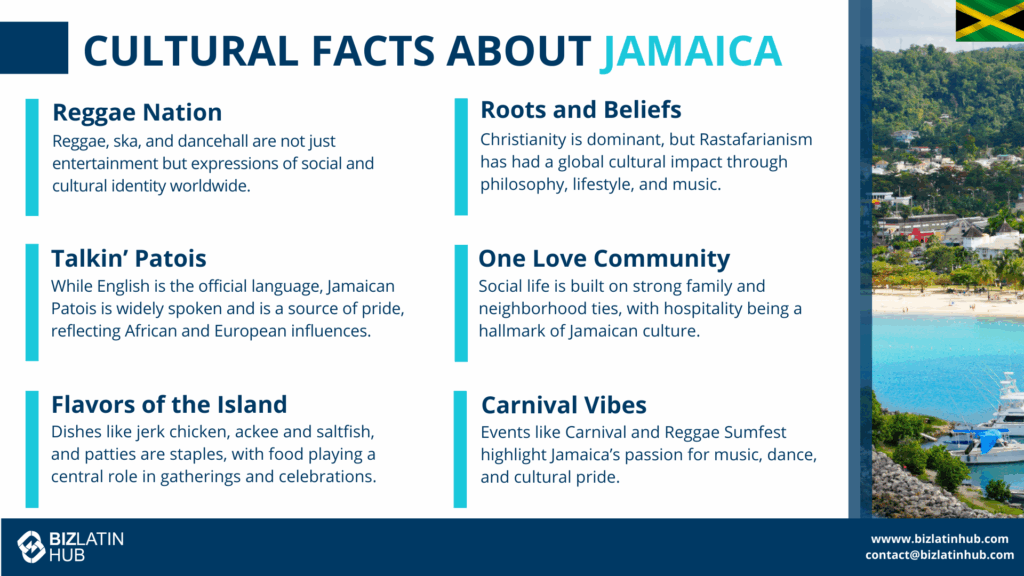Jamaica offers a dynamic business environment shaped by its rich cultural heritage, British colonial influences, and modern Caribbean identity. Whether you’re considering company formation in Jamaica, hiring local talent, or entering negotiations, understanding Jamaican business etiquette is key to building strong relationships and avoiding missteps. From greetings and communication styles to dress codes and negotiation tactics, this guide will help you navigate Jamaica’s professional landscape with confidence.
Key Takeaways on Etiquette in Jamaica
| How important is relationship-building in Jamaica? | Very important. Trust and rapport often precede formal business discussions. |
| Is punctuality strictly observed? | Being on time is appreciated, but slight delays are common and culturally accepted. |
| What is the preferred greeting in business settings? | A firm handshake, eye contact, and polite greeting such as “Good morning” or “Good afternoon.” |
| Should I use titles or first names? | Use formal titles (Mr./Ms.) until invited to use first names. |
| What is the dress code for meetings? | Professional and conservative. Lightweight suits for men; dresses or business suits for women. |
| Is direct communication preferred? | Diplomacy is valued. Avoid overly blunt criticism or aggressive negotiation tactics |
| Are business cards commonly exchanged? | Yes. Present them respectfully and include clear contact details |
Greetings and First Impressions
In Jamaica, first impressions matter. Business greetings are typically polite and formal. A firm handshake, eye contact, and a warm smile are standard. Men often stand when greeting women, and it’s customary to use formal titles until invited to use first names. Small talk about family, weather, or travel is common before diving into business matters.
Communication Style
Jamaican professionals value respectful and diplomatic communication. While English is the official language, Jamaican Patois may be used informally. Avoid overly direct criticism or confrontational tones. Instead, frame disagreements tactfully. Written communication, such as emails and proposals, should be clear, polite, and well-proofread.
Meetings and Negotiations
Business meetings in Jamaica often begin with casual conversation. While punctuality is appreciated, meetings may start slightly late due to traffic or cultural norms. Decision-making tends to be hierarchical, so respect for seniority is important. Negotiations prioritize relationship-building over aggressive tactics. Patience and trust are key to successful outcomes.
Dress Code and Professional Appearance
Despite the tropical climate, Jamaican business attire remains formal. Men should wear lightweight suits or dress shirts with jackets. Women are expected to wear conservative dresses, skirts, or pantsuits. Avoid overly casual or resort-style clothing such as flip-flops or tank tops in professional settings.
Jamaican work culture blends professionalism with a relaxed Caribbean rhythm. Hospitality is valued, accepting refreshments or engaging in light conversation helps build rapport. Respect for authority and seniority is common, and feedback is often given privately to maintain group harmony.
Sensitive Topics to Avoid
Avoid discussing politics, race, or religion unless you know your counterpart well. These topics can be sensitive and may derail business conversations. Also, be mindful of local holidays and observances when scheduling meetings.

FAQs on Business Etiquette in Jamaica
Use a firm handshake, eye contact, and a polite greeting such as “Good morning.” Use formal titles until invited to use first names.
While punctuality is appreciated, slight delays are culturally accepted. Always communicate if you expect to be late.
Dress professionally. Men should wear lightweight suits or jackets; women should opt for conservative business attire.
Initial communications are formal. Once relationships are established, tone may become more relaxed, but politeness remains essential.
Extremely important. Building trust through personal rapport and respectful interactions is often more valuable than transactional efficiency.
Yes. English is the official language, though understanding local expressions and cultural nuances can enhance rapport.
Yes. Present them respectfully and ensure they include clear contact details. A Jamaican phone number is helpful if available.
At Biz Latin Hub, our multilingual team offers expert support for company formation, legal compliance, recruitment, and back-office services in Jamaica. With deep local knowledge and a regional presence across Latin America and the Caribbean, we are your trusted partner for market entry and expansion.
Contact us today to learn more about doing business in Jamaica or explore our full suite of services.






